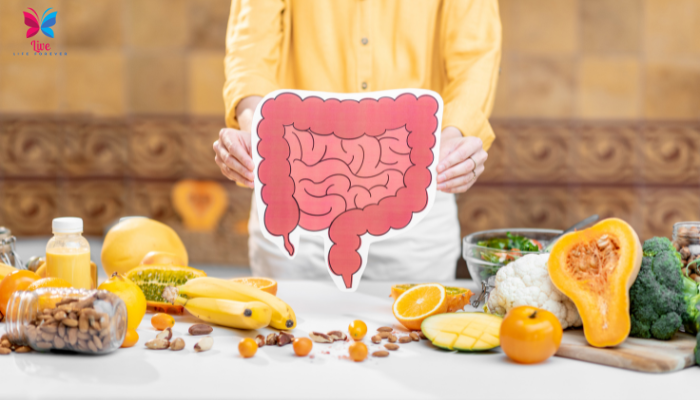A Comprehensive Analysis : Are Eggs Good For Gut Health

A Comprehensive Analysis : Are Eggs Good For Gut Health

Are Eggs Good For Gut Health
Eggs are a staple food in many cuisines and valued for their high quality protein content, vitamin and mineral content, and versatility. But there has been debate around whether eggs support or harm gut health. In this extensive article, we analyze the scientific evidence behind the effects of egg consumption on the gut microbiome and digestion.
An Overview of Egg Nutrition
Chicken eggs are considered one of nature’s most nutritionally complete foods. Here is a quick rundown of their nutritional highlights:
Protein
Eggs excel in high quality protein. Just one large egg provides about 6 grams of protein with all 9 essential amino acids . The protein digestibility-corrected amino acid score (PDCAAS) for eggs is 1.0 — the highest possible score . This makes eggs an optimal protein source for building and maintaining muscle.
Vitamins and Minerals
Eggs also contain an assortment of important micronutrients. One large egg provides vitamin A, folate, B12, iron and selenium, plus smaller amounts of others like vitamin E and zinc (3). Some even contain omega-3 fatty acids depending on the hen’s diet. Overall, eggs deliver a powerhouse nutrient package.
Antioxidants
In addition to vitamins and minerals, egg yolks house various antioxidants like lutein, zeaxanthin and carotenoids . Studies show these compounds accumulate in tissues like the eyes and brain, protecting against disease . Though egg whites contain less antioxidants, some are still present.
So eggs deliver ample protein alongside fat-soluble vitamins, minerals and antioxidants. But how does their nutritional profile impact gut health specifically? Let’s find out.
How Do Eggs Affect Gut Health and Digestion?
With nutrition covered, let’s analyze how eggs directly influence your gastrointestinal system. We’ll examine their effects on issues like digestion, gut inflammation, microbiome balance, gut permeability, IBS symptoms and more.
Digestibility
Despite harboring a range of beneficial nutrients, some people find eggs difficult to digest. This results from compounds found in egg whites.
Ovalbumin is the major protein in egg whites, accounting for over 50% of their protein content . It’s one of the most common food allergens, especially in children. Lysozyme is another heat-resistant egg white protein that triggers reactions for some people .
Those with egg allergies experience digestive upset like diarrhea, cramping and nausea after eating eggs . This demonstrates how eggs directly impact digestion.
However, egg allergy prevalence is quite low. Most children outgrow egg allergies by age 5, while estimates show less than 2% of adults in the US report allergic reactions to eggs .
For most people without allergies, eggs are highly digestible — especially when properly cooked. Scrambled, over easy and hard boiled eggs tend to be well tolerated thanks to protein denaturing from heat. Meanwhile, raw eggs could irritate those with sensitivities.
Overall, eggs mostly boast positive effects on digestion due to providing quality amino acids and fat, alongside ample vitamins and minerals needed to run digestive processes.

Intestinal Inflammation
Intestinal inflammation negatively affects gut health by harming the cell lining of your GI tract. This can increase gut permeability and activate your immune system .
So what about eggs? Can they calm or spark inflammatory fire?
Some speculate eggs may trigger intestinal inflammation via allergenic compounds described previously like ovalbumin. However, evidence demonstrating egg-induced inflammation in the guts of non-allergic people is lacking.
Counterintuitively, some research suggests eggs could suppress inflammatory pathways. Nicotinamide phosphoribosyltransferase (NAMPT) is as an inflammatory compound secreted by tumoral colon cell lines. When colon cells were treated with digested egg white hydrolysate, NAMPT secretion significantly decreased compared to casein protein control .
The paper concluded hydrolyzed egg white peptides could potentially reduce pro-inflammatory chemicals related to colon cancer development.
While excessive egg intake is not recommended for existing intestinal disorders, eggs likely hold neutral-to-beneficial effects on inflammation for most folks. As always, moderation is key.
Gut Microbiome Balance
Beyond basic digestion and inflammation reduction, optimal gut health requires balanced “good” and “bad” gut bacteria. Diverse microbiomes with specific strains like lactobacilli and bifidobacteria support metabolic and immune functions via fiber fermentation into healthy compounds like short-chain fatty acids (SCFAs) .
Can egg intake influence microbial populations? Let’s see what the research says.
One study had participants eat three eggs per day or a choline equivalent for 12 weeks. Bifidobacterium increased substantially in the egg group which was expected — eggs contain prebiotic components like choline that serve as fuel sources for certain beneficial bacteria like Bifidobacterium .
In another controlled trial, adults ate two eggs or oatmeal daily for 8 weeks. Both groups experienced increases in beneficial bacteria from baseline, though eggs produced greater raised levels of Faecalibacterium prausnitzii and Clostridiaceae .
Based on emerging research, eggs seem to enrich populations of beneficial bacteria like Bifidobacterium and Faecalibacterium prausnitzii. This demonstrates egg potential for enhancing microbial diversity linked to various health perks.
That said, those struggling with intestinal disorders may initially tolerate cooked whites better until gut inflammation subsides. Then yolks could provide nutrients to help repopulate healthy microbiota.
Intestinal Barrier Function
Your GI tract lining has two critical jobs — keeping pathogens and large food molecules from entering blood circulation while letting properly digested nutrients through. This balancing act requires intact tight junctions between your enterocytes (intestinal cells) .
When tight junctions separate and cause increased intestinal permeability, harmful compounds can slip into blood circulation triggering inflammation and autoimmune reactions. This is the crux of “leaky gut syndrome” .
Can egg consumption impact intestinal barrier function? The verdict is optimistic yet modest.
One study had 40 healthy men eat four eggs or a banana muffin daily for 12 weeks. Intestinal permeability markers like serum zonulin and interleukin concentrations showed no significant differences between groups. Both the eggs and muffins maintained healthy gut lining integrity .
In another trial, male rats fed diets supplemented with egg yolk powder for 14 days experienced improved intestinal architecture and cell junctions relative to controls — suggesting eggs strengthened intestinal barrier function (20). Rats also had higher levels of intestinal immunity markers.
Overall, while eggs provide protein and antioxidant support for intestinal cell regeneration, direct evidence proving they restore a “leaky” gut in humans remains limited. More studies should investigate effects on those with impaired gut barrier function rather than healthy subjects.
Still, eggs show potential upregulate intestinal immunity markers and preserve tight junctions — rather than disturb gut lining health.
IBS and IBD Symptoms
Egg effects also vary within irritable bowel syndrome (IBS) and inflammatory bowel disease (IBD) contexts. These conditions involve disturbed digestion with symptoms like diarrhea, cramping and bloating.
Some speculation exists around eggs worsening IBS flares. This links back to protein allergenicity explained previously. One study found those with IBS showed elevated biofilm levels of proteobacteria after consuming egg white powder — suggesting microbial imbalance eggs could aggravate symptoms .
Conversely, a RCT had IBS patients follow a low FODMAP diet plus consuming two eggs daily or avoiding eggs for 10 weeks. No differences existed between groups for symptoms scores or quality of life metrics .
For IBD, no direct evidence proves eggs trigger flares or worsen intestinal inflammation. This systematic review found no significant associations between eggs and risk or complications for either IBD subtype: Crohn’s disease and ulcerative colitis .
Overall, those struggling with IBS or IBD face inconclusive evidence around eggs being recovery foods or triggers. While eggs have shown prebiotic benefits that could ease digestive unrest over time, some chemical compounds may provoke immune responses in those highly sensitive.
As always, individual tolerance varies widely. Those struggling with intestinal issues should gauge reactions from cooked whites first before trying full eggs.

The Bottom Line: Can Eggs Improve Your Gut Health?
To wrap up, here’s the bottom line on whether eggs support a healthy gut:
- Eggs provide quality amino acids alongside gut-friendly vitamins and minerals like choline and selenium. This aids overall digestive capacity.
- Intolerances are possible but uncommon. Only around 2% of adults report egg allergies or inflammation issues.
- Early evidence suggests eggs may suppress inflammatory chemicals for non-allergic folks. Well-cooked whites are typically better tolerated than raw eggs, especially by those with sensitivities.
- Components like choline moderately enrich beneficial bacteria like Bifidobacterium and Faecalibacterium prausnitzii over time, supporting microbial diversity.
- While eggs likely don’t restore a “leaky” gut in humans, they show potential to preserve tight junctions for those without impairment. More research is needed.
- Evidence is inconclusive over whether eggs ease or worsen IBS and IBD symptoms. Individual reactions vary widely.
In the end, incorporating eggs can benefit gut function for most people based on nutrition support for enterocytes and microbial populations. That said, those with pre-existing intolerances or intestinal disorders should exercise caution, starting with cooked whites.
Overall eggs optimize rather than compromise digestive wellness for many folks thanks to their prebiotic nutrients and high quality protein. As always, individual tolerance differs based on unique digestive sensitivities.
Frequently Asked Questions
To expand on the impact of eggs on gut health, here are answers to some commonly asked questions:
Are egg yolks or whites better for gut health?
Egg whites tend to be more allergenic due to compounds like ovalbumin. However, nutrition-wise egg yolks contain more prebiotic components like choline plus fat-soluble vitamins A and E.
For most healthy people, whole eggs with both whites and yolks balance amino acids and gut-friendly nutrients. Those struggling with intolerances can start with just cooked whites before adding yolks.
Can eggs help improve gut microbiome diversity?
Potentially yes. Certain egg components like choline and carotenoids may selectively feed beneficial bacteria like Bifidobacterium and Faecalibacterium prausnitzii, as shown in early research.
Over time, incorporating eggs seems to enrich microbial populations linked to favorable gut effects rather than disturb balance. Those with impaired microbiomes may first focus on prebiotic plant foods over eggs when healing digestion.
Do eggs increase intestinal inflammation?
Unless you have an egg allergy, research shows eggs likely hold neutral or favorable effects on intestinal inflammation, rather than actively triggering it. Certain egg peptides may even suppress production of inflammatory chemicals.
However, some protein compounds could spark immune reactions in those highly sensitive. Cooked egg whites are typically gentler starter options for folks with impaired digestion.
Can eating eggs improve leaky gut symptoms?
Some speculation exists around eggs worsening intestinal permeability, though evidence in humans remains extremely limited. Conversely, some animal research finds eggs may strengthen intestinal barrier junctions and immunity markers.
That said, no direct studies prove eggs can “heal” leaky gut syndrome or restore impaired intestinal lining in humans. Their protein and antioxidants support enterocyte function but likely don’t dramatically reverse high permeability alone.
Are eggs safe to eat for people with IBS or IBD?
Evidence is inconclusive over whether eggs ease or aggravate IBS and IBD symptoms. While their prebiotic components show potential to reduce digestive unrest over time, protein allergens could also spark symptom flares for some.
Reactions vary individually even within IBS and IBD contexts. People with intestinal issues should start with small amounts of cooked whites and gauge effects before trying whole eggs.
The Takeaway: Enjoy Eggs in Moderation As Part of a Gut-Healthy Lifestyle
For most folks, incorporating eggs optimizes rather than disturbs your digestive wellness. Their protein, vitamins, minerals and antioxidants support overall gut and microbiome function.
That said, those with pre-existing intolerances or intestinal barrier disorders should exercise some caution. While cooked egg whites are often better tolerated initially, even whole eggs provoke reactions in a small subset.
As always, individual tolerance differs. Focus on an overall gut-nourishing diet beyond just eggs, with plenty fruits, vegetables, legumes, nuts, seeds and fermented items to feed beneficial bacteria.
In the end, for many people eggs can be part of balanced, anti-inflammatory dietary pattern that promotes optimal digestive health over the long term. Stick to moderate portions and gauge personal reactions.





I loved even more than you will get done right here. The overall look is nice, and the writing is stylish, but there’s something off about the way you write that makes me think that you should be careful what you say next. I will definitely be back again and again if you protect this hike.
I loved as much as you will receive carried out right here The sketch is tasteful your authored subject matter stylish nonetheless you command get got an edginess over that you wish be delivering the following unwell unquestionably come further formerly again as exactly the same nearly very often inside case you shield this hike